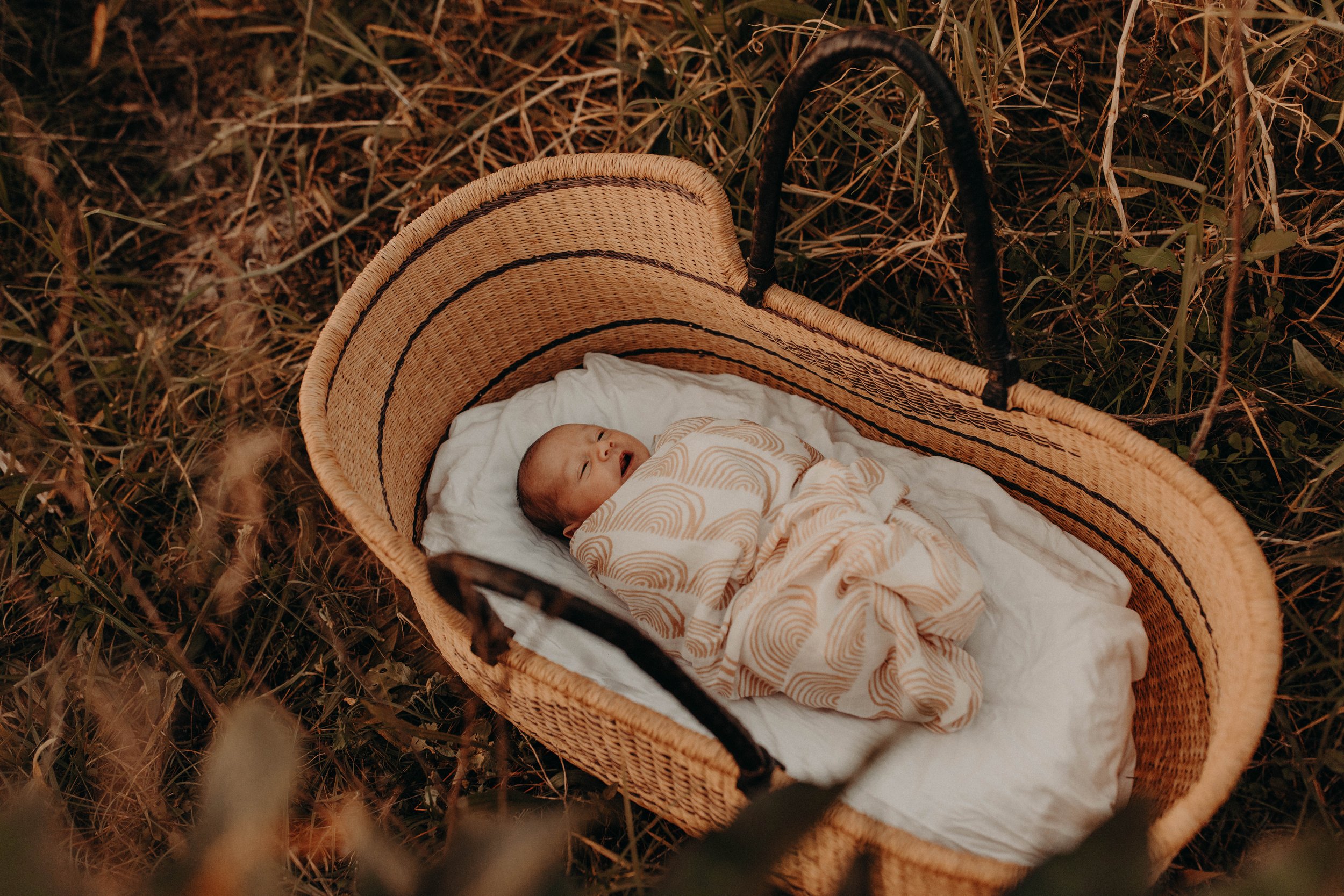Newborn Sleep
As a new parent one of the biggest challenges that you will face is broken sleep. Most families expect that they’re going to be awake at night feeding and caring for their baby however, the length of time that you will experience night waking is often surprising for families. This blog will explore what is normal for baby’s sleep, how to create a safe sleeping space, how to help your baby sleep better overnight and how to deal with sleep regressions.
Normal Newborn Sleep
It is normal for babies under the age of one to wake frequently overnight and this is in no way associated with any habits that you’ve created. There is no such thing as bad habits, so don’t let friends or family try to convince you that it is something that you’ve done wrong.
So, why is it that our babies wake up overnight? Human babies are born completely immature when compared to all other mammal babies. They’re born both physically and neurologically immature, meaning that they literally completely rely on their parents to stay alive. Babies are also born with stomachs the size of a marble, so they fill up very quickly but they also empty their tiny tummy really quickly too. Therefore, this means that our babies will wake frequently overnight to fill their tiny tummy but also to support the rapid brain growth in the first year of life.
In addition to a baby waking overnight for food, development, comfort, love and support they also wake frequently overnight to help sustain the mother’s breastmilk supply. The hormone responsible for making milk ‘Prolactin’ is highest in the early hours of the morning after midnight. When do babies tend to wake and feed more frequently overnight – after midnight!!! When a baby feeds more frequently during this period when the hormone Prolactin levels are highest, then they are better able to sustain and increase the mother’s milk supply by feeding during this time. How smart are our little babies!!! Using a BodyICE Woman breast pack warmed up, just before feeding or expressing can also help encourage your body to make more milk.
How often should my baby be waking overnight?
Keeping in mind our babies tiny tummy size, their physical and neurological immaturity they are going to wake up frequently overnight. But how often will depend on the age of your baby. A newborn baby will wake anywhere from hourly to every six hours overnight, in the first 6 weeks. From 6 weeks up until one year of age, a baby can wake anywhere from 0-2 times overnight. This is completely normal and actually necessary to support that individual baby’s growth and development needs.
Why do some babies need more sleep than others?
Just like you and I have different needs, our babies are individual people and all have different needs to support their development. This includes, sleep! Every single baby will have different sleep needs and that is normal. Some newborn babies only require 8 hours of sleep in a 24 hour period while other babies require 20 hours of sleep in a 24 hour period – that is a massive range of variation of normal. This means that each baby needs to be treated individually when it comes to their sleep needs, there is no one size fits all. Always remember that you are the expert of your baby, trust your intuition and what feels right to you.
How can I create a safe sleeping environment?
The best way to create a safe sleeping environment for your baby is to follow the Red Nose Guidelines for Safe Sleep.
These include:
1. Always sleeping your baby on their back this will ensure they can keep their airway clear as well as ensuring the baby can utilise their protective reflexes if needed.
2. Keep babies face and head uncovered – this means no beanies, hats or headbands that could cause any overheating or potentially be a suffocation risk.
3. Keep baby’s sleep environment smoke free before and after birth
4. The baby’s bedding and mattress need to be safe for all of the baby’s naps both during the day and night. It is essential that baby sleeps with their feet at the bottom of the bassinet or cot. This means no extra blankets, bumpers, toys or cushions in the bed.
5. Baby needs to sleep in their own safe sleep space in the parent or caregivers’ room for the first 6-12 months.
6. Breastfeed your baby if possible.
How can I help my baby sleep?
There is no way to magically make your baby sleep overnight, despite the books telling you that it is possible. The truth is, your baby will sleep on their own over time but that doesn’t mean there aren’t a few things that you can do to help them.
1. Make sure that they are getting enough milk – Check their wet nappies, behaviour and if concerned reach out to a lactation consultant for a proper assessment.
2. Help them develop their body clock – the best way that you can do this is by getting outside and enjoying your day with your baby. Yes, that’s right, it’s time to throw those strict routines out the window and let your baby nap out and about. Open the blinds the first thing in the morning, get outside, look at the trees, the birds and enjoy your time together – your baby will in the pram or baby carrier out and about. Sleeping in the daylight and sleeping in the dark at night will help your baby to learn the difference between night and day and thus develop their body clock.
3. Help your baby to develop sleep pressure – Day naps shouldn’t be sleeps, but they should just be naps to take the edge off their sleep pressure. Giving your baby rich sensory environments to grow, develop and enjoy their time with you is the best way to build their sleep pressure and help them be tired enough to sleep.
Remember, you don’t want to be spending all of your time stressing about your baby’s sleep, try to enjoy your time together with your baby as much as you can. There are no such thing as bad habits!!
Written by Lauren Brenton
Founder of One Mama Midwife Pty Ltd



